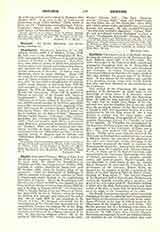

Zeno of Elea, Greek philosopher, b. at Elea, about 490 B.C. At his birthplace Xenophanes and Parmenides had established the metaphysical school of philosophy known as the Eleatic School. The chief doctrine of the school was the oneness and immutability of reality and the distrust of sense-knowledge which appears to testify to the existence of multiplicity and change. Zeno’s contribution to the literature of the school consisted of a treatise, now lost, in which, according to Plato, he argued indirectly against the reality of notion and the existence of the manifold. There were, it seems, several discourses, in each of which he made a supposition, or hypothesis, and then proceeded to show the absurd consequences that would follow. This is now known as the method of indirect proof, or reductio ad absurdum, and it appears to have been first used by Zeno. Aristotle in his “Physics” has preserved the arguments by which Zeno tried to prove that notion is only apparent, or that real motion is an absurdity. The arguments are fallacious, because, as Aristotle has no difficulty in showing, they are founded on false notions of motion and space. They are, however, specious, and might well have puzzled an opponent in those days, before logic had been developed as a science. They earned for Zeno the title of “the first dialectician”, and, because they seemed to be an unanswerable challenge to those who relied on the verdict of the senses, they helped to prepare the way for the skepticism of the Sophists. Besides, the method of indirect proof opened up for the sophist new possibilities in the way of contentious argument, and was very soon developed into a means of confuting an opponent. It is, consequently, the forerunner of the Eristic method, or method of strife.
WILLIAM TURNER

